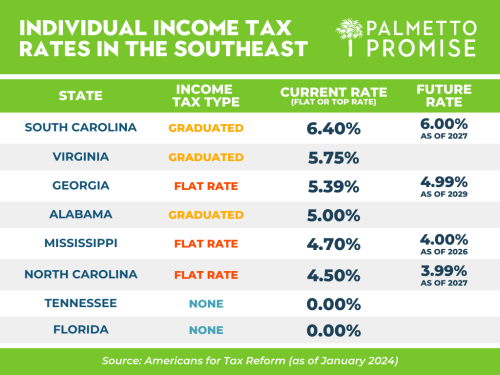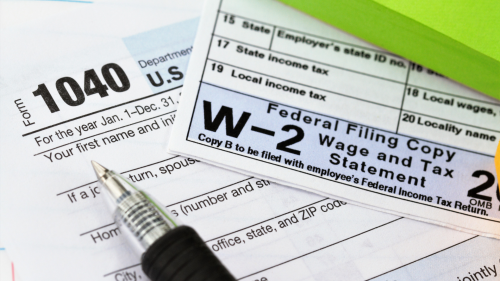A Tax Cut Ten Years in the Making
Shortly after Palmetto Promise Institute was born, we were approached by former state Secretary of Commerce Joe Taylor about weighing in on tax policy. He had seen the ill effects of our broken-down tax system and wanted aggressive reform.
With Taylor’s generous support, we released comprehensive studies by pre-eminent South Carolina economist Dr. Rebecca Gunnlauggsson in 2014 and 2019. Shortly thereafter, the State Chamber of Commerce and the State Association of Realtors each published excellent tax papers. (Palmetto Promise summarized the findings of all four tax reports in Essential South Carolina Tax Reforms, published in January 2025, and in videos here and here.)
In 2014, we all called for dramatic reforms to a South Carolina system that was unfair, unstable, and uncompetitive.
But was anyone listening?
The tenth anniversary of the release of our first study came and went without any major reform to any type of tax—income, sales, or property. Admittedly, the legislature was spooked by the backlash from Act 388 (2006), their roll back of residential property taxes made possible by raising the state sales tax. Yes, 388 was a mixed success, but nearly 20 years is a long recuperation period from a bold tax policy move! Meanwhile, our neighboring states have continued to outpace us, cutting their income tax rates.

Then came H.4216, rolled out by Speaker Murrell Smith (R-Sumter) in a news conference on March 25, 2025.
We were stunned and thrilled. After 11 years of frustration, the bill was the stuff of dreams.
Here’s what it does:
- Lowers the Individual Income Tax rate from 6.2% to 3.99%.
- Sets in place a plan to drop to 2.49% if revenue triggers are met. (Of states with an Individual Income Tax, Arizona is lowest at 2.5%. Our neighbors in Georgia are headed for 4.99% by 2029, while North Carolina will be at 3.99% by 2027.)
- Does not broaden the tax base (meaning it does not tax previously untaxed goods or services) in order to pay for the rate reduction as some other income tax-cutting states have done.
- Shifts from a graduated/progressive tax to a flat tax.
- Maintains a small Individual Income Tax in order to create stability should property or sales taxes wane. This is known at the “three-legged stool” of tax stability and balance.
- Shifts to federal Adjusted Gross Income (AGI) as starting point for determining income, joining 37 other states that use federal AGI. This will see more of the 42% of citizens currently paying $0 having some skin in the game, even if small.
Remember this: individual filing status doesn’t always mean an individual or a family filer. Well over half a million small businesses in South Carolina file under the individual system. Normally, these businesses are taxed at 3% under the South Carolina Income Tax Act as pass-through entities, which is better than 3.99%, so the stretch goal of 2.49% will represent a tax cut for these businesses as well.
Earlier, we mentioned 11 years of frustration. This is not entirely the case, and a little history will show how the tax cut proposed this week could become even greater.
In 2022, when South Carolina shifted from the 7% rate to the 6.5% Individual Income Tax rate and collapsed the brackets from six to three, and other reforms, there were differences between the Senate and the House headed into Conference Committee.
The Senate had proposed to step down to 5.7% immediately with three brackets. The House favored a flatter tax (just two brackets) with a 6% rate.
At that time, and again in the news conference this week, Senator Harvey Peeler (R-Cherokee), Chairman of the Senate Finance Committee, essentially challenged the House to a tax cut contest.
“You can’t out tax cut Harvey Peeler, so let’s get down to the negotiation table,” he said. In yesterday’s press conference, he reupped this, saying he would make the House bill “even better” in the Senate.
So, stay tuned. The dramatic House tax cut could grow even larger. But one thing remains clear—we are seeing a historic level of unity between leadership in the House, the Senate, and the Governor’s Office in support of this dramatic income tax cut. Relief is on the way, South Carolina!
PS: Check out our friend Patrick Gleason’s article in Forbes on this historic tax cut.





